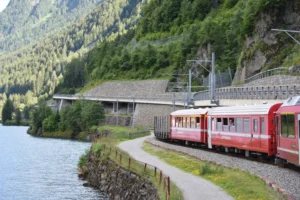A lot of folks think that Eurail Passes aren’t worth it. They talk about mandatory seat reservations and say that they ruin the Eurail Pass. “Why bother with a Eurail Pass,” they say, “if I have to book seats all the time?” We get it, it can be a hassle. But it’s important to understand that it’s only on some trains in some countries. The need for reservations isn’t everywhere across the European rail network. In fact, many countries, especially for domestic and regional travel, you can just hop on trains with your Eurail Pass, even high speed trains.
However, it’s also true that some countries have what you might call “unfriendly” policies towards Eurail Pass holders. These are the places where reservations are frequently required, and sometimes, those mandatory reservation fees can be quite expensive, significantly adding to the cost of your trip.

If you’re planning a Eurail trip, you’ll most likely run into these reservation requirements in France, followed by Italy and Spain. These countries have extensive high-speed rail networks, which, while incredibly convenient, come with mandatory reservation fees for pass holders.
But here’s the counterpoint: it’s primarily those high-speed trains that come with mandatory reservation fees. If you’re willing to embrace a slightly slower pace, you can often avoid these extra costs altogether. Regional trains, which connect smaller towns and cities, never require reservations. This means you can still enjoy a huge amount of flexibility, hopping on and off as you please, and discovering hidden gems across Europe without constantly worrying about booking a seat.
Of course, realistically, everyone wants to ride the fast trains. We’ll get into the details of how to deal with those reservation fees a bit later. But it’s important to remember that the freedom and initial promise of the Eurail Global Pass – the ability to spontaneously explore Europe by train with a single price – is still very much alive and well across much of the continent.
Places The Eurail Pass Shines
In many countries, you can still experience the joy of flexible, reservation-free travel. Places like the Netherlands, Germany, Belgium, and Switzerland are generally very Eurail-friendly, with most domestic trains not requiring any seat reservations. This means you can easily explore these countries at your own pace, without constantly needing to plan ahead or pay extra.

This core concept of using a Eurail Pass to “bop around” Europe is what makes it so appealing. Imagine arriving in Amsterdam with your pass, hopping on a train to Rotterdam on a whim, spending the day exploring the city, and then catching a different train to Utrecht for the evening, all without having to buy individual tickets each time. Or picture yourself in Germany, taking a trip through the Black Forest, stopping at charming villages along the way, and walking on trains like you owned ’em. The Eurail Pass provides that kind of freedom. You’ve paid a single price upfront, and that gives you a passport to explore the rails in a huge portion of Europe. It’s about having the flexibility to change your plans, follow your interests, and discover the unexpected, all while keeping your travel budget relatively predictable.
For most of Europe, the Eurail Pass is still your ticket to easy, breezy train travel. You can often just slip aboard a train, find a seat, and show your pass, without having to book anything in advance. While it’s true that some countries have those “unfriendly” reservation policies, the Eurail Pass truly shines in the rest of Europe, offering the flexibility and convenience it was designed for.
Countries Where The Eurail Pass Has Mandatory Reservation Fees
Ah France. It’s true that France has a lot of high-speed TGV trains, and these almost always require reservations. So, if you’re planning to zip across the country on those fast trains, you will need to factor in the extra cost of those seat reservations. However, it’s important to understand that you can still absolutely use your Eurail Pass in France. You’re not barred from the trains! You’ll just need to pay a premium for the speed and convenience of those premium TGV services.
Even in countries like France, where high-speed travel often necessitates reservations, a Eurail Pass can still be a valuable asset, particularly if those countries are integral to your travel plans.
Sometime, specific operators are the culprits with high reservation fees. Eurostar, which includes the former Thalys trains, is one to be aware of. It’s a premium service, with premium prices. The mandatory reservation is about 30 euro. Ouch.
The Eurocity Direct train between Amsterdam and Brussels is a great example of a travel hack to get around these mandatory fees. By choosing this train, you can travel between these two major cities without the need for reservations, making it a more Eurail-friendly and potentially cheaper option than the high-speed Eurostar.
It’s also worth noting that a new high-speed train service, the Eurocity Direct, has recently launched between Amsterdam and Brussels. This service offers a faster and more comfortable journey than the previous Intercity connection, with a travel time of around 2 hours. While it’s not a high-speed train in the same category as the TGV or Eurostar, it utilizes high-speed lines to reach speeds of 200 km/h. Importantly, reservations are not required on the Eurocity Direct, making it a very Eurail-friendly option for travel between these two cities.
Eurocity Direct and Eurocity | Eurail.com
Moving beyond France, Italy and Spain also have their own reservation quirks. In Italy, high-speed Le Frecce trains require reservations, and while the fees aren’t exorbitant, they do add to your overall travel costs. Spain is even trickier, as reservations are compulsory for most long-distance and medium-distance trains, and these often need to be made in person at a local train station. This can eat into your travel time and require some extra planning.

While options to avoid these fees exist, such as taking slower regional trains, the reality is that most travelers want to make the most of their time and opt for the faster, high-speed services. It’s important to remember that your Eurail Pass does cover the base fare of the train ticket, which is often the bulk of the travel cost. The reservation fee is an additional charge on top of that, allowing you to secure a specific seat on that train.
How Much Are Eurail Reservation Fees
Here’s a breakdown of what you might expect to pay in reservation fees:
- France: For TGV trains, expect to pay around €10-20 for a 2nd class seat.
- Eurostar: Eurostar fees are typically €30-40 for Standard class, depending on the route (e.g., London to Paris vs. London to Amsterdam).
- Italy: Reservations for Le Frecce trains usually cost around €10-15 in 2nd class.
- Spain: Expect to pay €5-20 for most long-distance and high-speed trains.
Are Seat Reservations Mandatory on Eurail
But let’s shift our focus to the many places where you don’t have to worry about these extra costs. In a significant portion of Europe, the Eurail Pass truly shines, allowing you to travel freely and spontaneously.
Here are some countries where reservations are generally not required for most trains:
- Netherlands: The majority of trains in the Netherlands, including the Intercity and Sprinter services that connect major cities and regional destinations, do not require reservations. You can easily travel between Amsterdam, Rotterdam, The Hague, Utrecht, and other cities without any additional fees.
- Germany: Germany’s extensive rail network, including its high-speed Intercity-Express (ICE) trains, generally does not require reservations for domestic travel. This makes it incredibly easy to explore the country’s diverse cities and landscapes with a Eurail Pass.
- Belgium: Similar to the Netherlands, most domestic trains in Belgium, including Intercity and regional services, do not require reservations. You can simply hop on and off trains to explore cities like Brussels, Bruges, Ghent, and Antwerp.
- Switzerland: Switzerland’s efficient and scenic train network is also largely reservation-free. You can travel on most domestic trains, including InterRegio and RegioExpress services, without needing to book a seat in advance.
Here are some other countries where you’ll also find travel to be very Eurail-friendly:
- Austria
- Czech Republic
- Denmark
- Hungary
In these “”friendly”” countries, you can often just show up at the station and hop on a train, without needing to worry about pre-booking a seat or incurring extra fees. This allows for a much more spontaneous and enjoyable travel experience.
For a visual guide to which parts of Europe are most Eurail-friendly and where you might encounter more reservation hassles, check out the article on Rail Motus: What countries are included in the Eurail pass? – Rail Motus

Summary of Key Points So Far
So, where are we? We’ve established that a Eurail Pass can be a fantastic way to travel through Europe, offering a ton of flexibility and convenience. It’s not a scam, and it’s definitely not useless. You absolutely can still use a Eurail Pass to travel spontaneously across much of Europe, without needing to plan every single train ride in advance or pay extra fees.
However, it’s also important to be aware that in some countries, particularly France, Italy, and Spain, reservations are often mandatory for high-speed trains. This means that while your Eurail Pass covers the base fare, you’ll need to pay a bit extra to secure your seat on those specific trains.
When Optional Reservations Make Sense
But what about those times when reservations aren’t strictly mandatory, but you might want to make one anyway? Let’s dive into that.
While many train journeys in Europe don’t require reservations, there are definitely situations where securing a seat in advance is a smart move. Even if it means paying a small fee, the peace of mind and comfort can be well worth it. Here are some scenarios where you might want to consider making an optional reservation:

- Traveling during peak season: If you’re traveling during the summer months (June-August) or around major holidays, trains can get very crowded. Reserving a seat ensures you won’t be left standing for hours, especially on long journeys.
- Traveling on popular routes: Some train routes are consistently busy, regardless of the time of year. If you’re taking a popular scenic route or traveling between major cities, a reservation can guarantee you a seat.
- Traveling with a group: If you’re traveling with family or friends and want to sit together, reserving seats is highly recommended. This is especially important for larger groups, as finding multiple adjacent seats on a crowded train can be challenging.
- Taking a long journey: For long-distance train travel, a seat reservation can make the trip much more comfortable. Knowing you have a guaranteed place to sit can help you relax and enjoy the journey, especially if you plan to work or sleep on the train.
Exceptions: Tourist Trains, Mountain Trains, and Scenic Routes
It’s also worth noting that certain types of trains, even in countries that generally don’t require reservations, often do.
- Tourist Trains: Special trains designed for sightseeing, often with unique features like panoramic windows, may require reservations.
- Mountain Trains: Trains that climb to significant elevations, particularly those popular in mountainous regions like Switzerland, frequently require reservations. These trains often offer stunning views and access to otherwise inaccessible areas.
- Scenic Routes: Even if a train isn’t a dedicated “”tourist train,”” if it travels along a particularly beautiful or popular route, reservations might be necessary.

For instance, the Glacier Express and the Bernina Express in Switzerland are prime examples. These trains offer stunning Alpine scenery through panoramic windows and are incredibly popular with tourists. While reservations are mandatory, your Eurail Pass ensures that you’re not paying the full ticket price, but rather a much smaller reservation fee. The Eurail Pass is still a good choice for those that are interested in riding these trains.
Sleeper Trains
Another type of train that almost always requires a reservation is the sleeper train. Unlike regular daytime trains, sleeper trains offer accommodations for overnight travel, allowing you to sleep while traveling long distances. These reservations are not usually referred to as “”seat reservations,”” since you aren’t just reserving a seat, but rather a place to lie down and sleep.
Here’s a breakdown of how it works:
- Eurail Pass Covers the Base Fare: Your Eurail Pass covers the basic transportation cost of traveling on the train.
- Reservation Fee for Accommodation: You’ll need to pay an additional fee to reserve the specific sleeping accommodation you want. This fee varies depending on the type of accommodation.
The accommodation options on sleeper trains typically include:

- Seats: The most basic and cheapest option, these are regular train seats, which may recline slightly. This type of accommodation, while on a sleeper train, usually does not require mandatory reservations. You just need to sleep in an upright seat, probably an unpleasant experience for the lengthy travel time of overnight trains.
- Couchettes: These are more comfortable than seats, offering a bunk bed in a shared compartment with other travelers. This reservation fee is substantial, but not exorbitant.
- Sleepers: The most comfortable option, sleepers provide a bed in a private or shared compartment and sometimes include additional amenities like a washbasin or even a private bathroom. These reservation fees are the most expensive type, rivaling or exceeding cheap hotel costs. We love them, they’re great, but be prepared to pre book as far in advance as possible and pay a significant amount for the reservation.
So, while your Eurail Pass gets you from point A to point B on the sleeper train, the reservation fee covers the upgrade from a regular seat to a proper sleeping arrangement.
Eurail Reservation Caveats
Here are some other things to keep in mind when planning your Eurail trip:
- Children Still Need Reservations: Even if your child travels for free with a Eurail Pass, you’ll still need to pay the reservation fee for their seat on trains that require reservations. This means that if you’re traveling with your family on a high-speed train, you’ll need to factor in the cost of reservations for every member of your group, even the little ones with free passes.
- Limited Seats for Pass Holders: Some trains have a limited number of seats available to Eurail Pass holders, so it’s best to book in advance. Looking at you, France.
- Book in Advance: For popular or high-demand trains, especially during peak season, reservations should be made well in advance to secure your spot.
- Different Booking Methods: You might need to use different platforms or methods (online, station, rail carrier) to make reservations, depending on the train and country. seat61.com has an excellent section on how to book reservations with a Eurail Pass discount. For specific answers per country, refer here: InterRail & Eurail reservation fees | How to make reservations with a pass
- Non-Refundable: Reservation fees are usually non-refundable, even if your plans change.
- Missed Connections: If you miss a train with a mandatory reservation due to a delay, you may have to pay for a new reservation.
- Specific Seat/Train: A reservation is typically valid for a specific seat on a specific train. If you end up not sitting in your assigned seat, or taking a different train, your reservation may not be valid. It’s best to check with the train operator for details on their specific policies.
Conclusion
So, let’s bring it all together. Yes, navigating seat reservations with a Eurail Pass can be a bit of a puzzle. It’s not as simple as just hopping on any train, anytime, anywhere. You’ll need to do a little planning, especially if you plan to travel on high-speed trains or in certain countries. And those extra reservation fees? They’re an added cost, no doubt.
But don’t let this discourage you from considering a Eurail Pass. For the most part, a Eurail Pass still offers tremendous value.

Think of it this way:
- The Eurail Pass is your ticket: It covers the base fare of train travel, which is often the most expensive part, especially for long-distance journeys.
- Reservations are an add-on: The reservation fee is a separate charge for a specific seat on a particular train. It’s a bit like paying extra to reserve a specific seat on a flight.
In many cases, the cost of reservations will be far less than the cost of buying individual tickets for each journey, especially if you’re taking multiple trains across several countries.
More importantly, a Eurail Pass grants you a level of flexibility that individual tickets simply can’t match. It allows you to:
- Travel spontaneously: Change your itinerary on the fly and hop on a train to a new destination without having to purchase a new ticket.
- Explore hidden gems: Use those reservation-free regional trains to discover smaller towns and villages that you might otherwise miss.
- Enjoy seamless travel: Experience the convenience of having a single pass for train travel across multiple countries.
Ultimately, the decision of whether or not to buy a Eurail Pass depends on your individual travel style, budget, and itinerary. If you prioritize flexibility and plan to travel extensively by train, it’s likely still a worthwhile investment.

